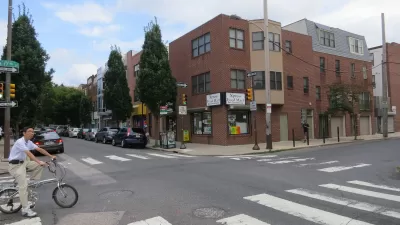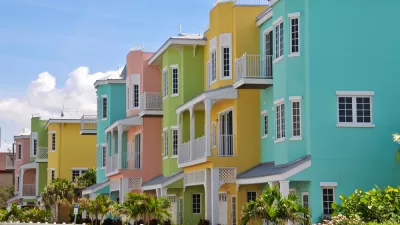A major study by the Harvard University Graduate School of Design, "Revitalizing Places: Improving Housing and Neighborhoods from Block to Metropolis," identifies planning strategies to improve housing and urban development practices.
A major study by the Harvard University Graduate School of Design, Revitalizing Places: Improving Housing and Neighborhoods from Block to Metropolis [pdf], identified policy, planning and design strategies to improve urban housing and communities.
The study considers a variety of planning objectives including economic development, social equity, and community livability. The report discusses the benefits and costs of increasing urban densities, and practical challenges of urban infill. It considers diverse housing demands and ways to satisfy them. It identified four key strategies for creating more sustainable and inclusive communities:
- Policies and programs to support more and better infill development in core cities and suburbs. These include simplifying infill developments, promoting public acceptance of infill, and promoting accessory apartments.
- Urban expansion that with appropriate infrastructure and services, and innovative designs to comprehensively develop neighborhoods and new towns.
- Strategies to retrofit existing areas in response to concerns about existing developments. This includes upgrading inadequate services and infrastructure, creating attractive, mixed-use neighborhood centers, improving access to jobs and services, and dealing with abandoned housing.
- Improving data coordination and performance indicators. Data and information sharing is key to understand the effects of policies and programs. Indicators can provide feedback on the process and interim achievements, helping recalibrate and improve actions.
The report builds on research and examples from around the world that define optimal urban development patterns, and the policies that help make this happen, including regulatory and planning reforms, infrastructure financing options, land assembly methods, government agency coordination, infrastructure and housing investment practices, property tax policies, and improved public engagement and data collection practices. Although the study focused on Mexico, many of the concepts apply to all cities, in both developed and developing countries.
FULL STORY: Revitalizing Places: Improving Housing and Neighborhoods from Block to Metropolis [pdf]

Alabama: Trump Terminates Settlements for Black Communities Harmed By Raw Sewage
Trump deemed the landmark civil rights agreement “illegal DEI and environmental justice policy.”

Study: Maui’s Plan to Convert Vacation Rentals to Long-Term Housing Could Cause Nearly $1 Billion Economic Loss
The plan would reduce visitor accommodation by 25% resulting in 1,900 jobs lost.

Planetizen Federal Action Tracker
A weekly monitor of how Trump’s orders and actions are impacting planners and planning in America.

Wind Energy on the Rise Despite Federal Policy Reversal
The Trump administration is revoking federal support for renewable energy, but demand for new projects continues unabated.

Passengers Flock to Caltrain After Electrification
The new electric trains are running faster and more reliably, leading to strong ridership growth on the Bay Area rail system.

Texas Churches Rally Behind ‘Yes in God’s Back Yard’ Legislation
Religious leaders want the state to reduce zoning regulations to streamline leasing church-owned land to housing developers.
Urban Design for Planners 1: Software Tools
This six-course series explores essential urban design concepts using open source software and equips planners with the tools they need to participate fully in the urban design process.
Planning for Universal Design
Learn the tools for implementing Universal Design in planning regulations.
Caltrans
Smith Gee Studio
Institute for Housing and Urban Development Studies (IHS)
City of Grandview
Harvard GSD Executive Education
Toledo-Lucas County Plan Commissions
Salt Lake City
NYU Wagner Graduate School of Public Service




























